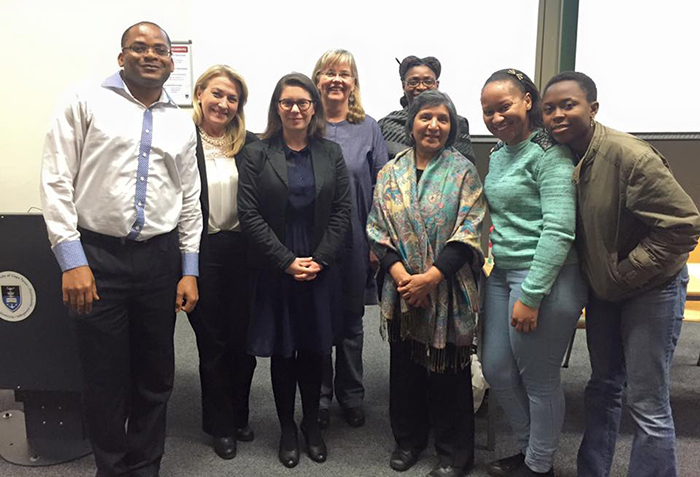Do legal frameworks protect women's rights?
31 August 2015 | Story by Newsroom
A running thread that emerged from a special Women's Roundtable was the question of whether or not legal frameworks are effective in the protection of women's rights.
The theme of the roundtable, hosted by the Postgraduate Law Students' Council in the Kramer Law Building on 20 August 2015, was Women in Conflict: Property Rights and Access to Justice.
UCT's Professor Rashida Manjoo (former UN special rapporteur on violence against women) moderated the discussion, with Dr Aninka Claassens (UCT's Centre for Law and Society), Sanja Bornman (Women's Legal Centre) and Sune Griessel (Office of the Public Protector) on the panel. All are experts in their fields.
Griessel noted that many of the complaints handled by her office amounted to 'silent complaints', those stories that were not sufficiently high profile to enjoy media attention. Based on her more than two decades of experience in the justice sector, she felt economic disempowerment was the biggest enemy of women.
Bornman talked about how the Domestic Violence Act has done little to protect women. Speaking from the perspective of cases handled by the Women's Legal Centre, she stressed the shortcomings of the South African Police Service in their treatment of domestic violence matters. She highlighted women's difficulties in securing protection orders against domestic abuse and the insufficiency of adequate shelters for abused women.
Claassens talked about how women negotiated change in customary land law, often outside state intervention. These negotiations were based on declining marriage rates, the basic needs of children, the emergence of female-headed households, and above all, constitutional claims of equality. Notably, significant factors on women's negotiating ability is their de facto land rights, which official customary law failed to acknowledge, the changing gender balance of power at national level, and traditional leadership laws that undermine the inherent flexibility of customary law.
She surmised that the evolution of women's claims to land – first from their sons, then their daughters, and finally on their own behalf – is largely traceable to the liberating influence of the Constitution and the values of the anti-apartheid struggle.
Moderating the discussion, Manjoo identified several questions that affect women in conflict situations. The common denominator is the issue of state responsibility and accountability for violations of women's human rights.
At a national level, she also questioned the effectiveness of Chapter 9 institutions (established in terms of the Constitution to strengthen and safeguard the democracy) in protecting and promoting women's rights. The most notable of these are the Public Protector, the Commission for Gender Equality, and the South African Human Rights Commission. Together with the Constitution, law enforcement agents, and the judiciary, these institutions constitute the core of the legal framework for the protection of women's rights.
So does this legal framework protect women?
Griessel is not convinced, while Bornman believes the framework was good, but stymied by those tasked with implementing it, and Claassens feels it has a liberating influence.
The roundtable was united on one point, however: that the protection of women's rights would not improve without individuals becoming active agents of change in their social milieu.
Report from Anthony C Diala, chair of the Postgraduate Law Students' Council
 This work is licensed under a Creative Commons Attribution-NoDerivatives 4.0 International License.
This work is licensed under a Creative Commons Attribution-NoDerivatives 4.0 International License.
Please view the republishing articles page for more information.










